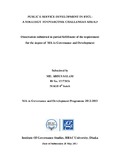Public e-service development in BTCL: a strategy to overcome challenges ahead

View/
Date
2013-05-20Publisher
BRAC UniversityAuthor
Salam, Md. AbdusMetadata
Show full item recordAbstract
Rapid development of Information and Communication Technology (ICT) creates extensive opportunities for efficient and cost effective public service delivery. The use of ICT has been a core element used by the government as a communication way to its citizen. E-service(s) delivery is present in developing countries but the erudition is still in immaturity level. Most local governments only provide published information and downloadable forms. Most local government sites provide only informational and one way communications. All are still at the basic level of publishing information online. Two way interactive e-services have already been introduced with limited extent by some institutions in our country like online application of university admission, online job application to BPSC and Banks etc. Before implementing and developing any e-services, the authorities should know the expectation to the service from the users and it is also important to know the usability of the e-service in order to develop it with more usability function so that the users might satisfy by using the service. This study has attempted to assess the current standings of e-service(s) and what would be the prospective e-service(s) provided by BTCL. It has also endeavored to identify the barriers/challenges to adopt public e-service(s) in BTCL. Due to time and resource constraints only selective areas of Dhaka city has been surveyed.
The study is based on both literature review and questionnaire survey. Two types of questionnaire were prepared. One for supply side i.e. for officials of BTCL and another was for demand side i.e. customer of BTCL. Questionnaire survey was conducted on total 52(fifty two) respondents. Of them, 27(twenty seven) was officials and the rest 25(twenty five) was subscribers of different areas of BTCL in Dhaka city. A literature review covers theoretical tools to define effective e-service and to identify hindrance in implementing e-service(s) in BTCL. The study has identified some prospective public e-services that BTCL should attain to retain its existence. It has also identified the possible barriers for implementing e-service(s).
The perception of the officials and subscribers about prospective e-service(s) and hindering factors of e-service implementation is somewhat similar. The hindering factors are categorized in three types, organizational, procedural and technological. Finally, the study comes up with some recommendations to overcome the barriers or challenges in adopting public e-service(s) in BTCL.
